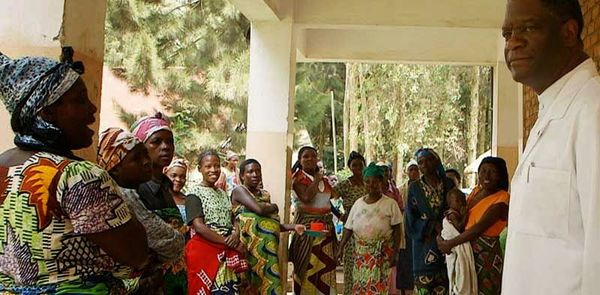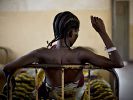Eye For Film >> Movies >> Congo: The Doctor Who Saves Women (2015) Film Review
Congo: The Doctor Who Saves Women
Reviewed by: Jennie Kermode

Around the world, it is commonly assumed that there has been peace in the Congo since 2003, when the second of the country's two great wars came to an end. This is not the case for the country's women. Described by a UN specialist in sexual violence as the rape capital of the world, it remains a place with shockingly high rates of sexual assault, often committed by armed gangs and doing horrific physical as well as psychological damage. The women affected are often blamed for the assaults on them and rejected by family members, friends and whole communities. One man, Dr Denis Mukwege, has devoted his life to repairing their bodies and trying to help them regain control of their lives.
Banned in the Congo, ostensibly because of fears it will sully the country's image, this powerful documentary not only depicts the work of the Sakharov Prize-winning physician but shows the strong teamwork that keeps the Panzi clinic running and, importantly, gives its patients the chance to speak publicly about what happened to them. As one might expect, it is this part of the film that is most harrowing, especially when one woman acts out parts of the assault upon her, collapsing on the ground when she is done. A 16-year-old girl talks about how a man broke into her house and raped her and now she is pregnant - she might abandon the baby, she says, if she can't get help with housing, because otherwise her family will try to marry her to her assailant. A 22-year-old talks about how, after arriving at the clinic, she learned that her husband had moved all her belongings to her sister's house, saying she was no longer welcome in her home because, by being raped, she had betrayed him.

These are just a small number of the stories told in a film which is not for the faint hearted. There are worse ones. What's remarkable is that director Diabang manages to keep them feeling fresh, each one shocking to hear. This is achieved by spacing them out around much more prosaic (but still interesting) material. She looks, for instance, at how counsellors at the clinic help the women cope with the psychological impact of what they have been through; at how some of the surgery is performed; at how practical skills are taught so that those leaving the clinic will be able to find work; and at how they ensue that every woman who goes there learns to read and write. One girl, who was raped on the way to school, describes how she was always in the top five in her class an how all she really wants to do is study.
Over the course of his career, Mukwege is estimated to have operated on more than 40,000 rape victims. A colleague laughs at nervous rumours he might run for president. He's got far too much work to do already, she says. There is a fiercely optimistic atmosphere at the clinic in spite of everything. Some women return there years later with severe psychological problems caused by their trauma; some leave only to be raped again; but others reclaim their place in the world. Strong willed and passionate about their country, they are the sort of citizens any country would be proud of. Perhaps they can give Congo a future that is better than this. In the darkest of tales, where you might never expect it, there is room for a happy ending.
Reviewed on: 13 Nov 2015














